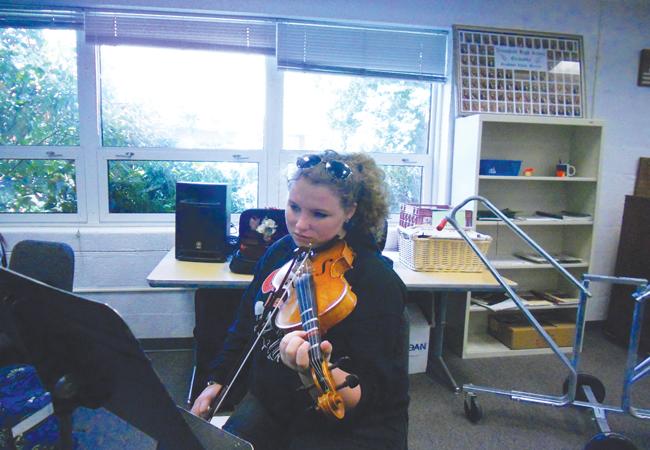Normally a home away from home, the orchestra room transforms during audition week, morphing into a hall of nervous students miming various finger positions and frantically practicing arpeggios. The stress-filled week is followed by an email sent out to each student individually, containing the measure of their success: their class level placement for next year.
Current orchestra students and about 25 rising freshmen put their talents to the test on April 30 and May 2 when the orchestra department held their annual auditions.
These grueling tests are a school wide event and require a lot of effort and preparation. Students were required to play scales, arpeggios and an excerpt while orchestra teacher and director Angela Ammerman judged them on their intonation, speed, musicality and accuracy in terms of finger placement and rhythm. This ammount of work that students have to do to prepare can place an enormous amount of stress them.
“A lot of the artiste kids who were auditioning for chamber had a lot of stress on them because they wanted to make it to the top orchestra,” junior Rani Bango, a member of philharmonic orchestra, said.
Students notice that good class performance does not necessarily guarantee admittance to the next level; a poor audition can ruin students’ chances to advance.
“Even though we might be good, we have to prove that we’re good. We have to practice or else we won’t get into what we want. If we want to go someplace, we have to push ourselves, and we have to push ourselves that much farther. That stress, coupled with things we have in school, just makes life a bit harder,” junior Kristina Nguyen said. Nguyen will continue to be part of the sinfonia orchestra this fall.
After all their preparation, students have just found out their results, and while the hard work paid off for some, others were frustrated and upset.
“When they didn’t make it, a lot of them were disappointed and some even cried,” Bango.
“A third of the orchestra I’m in stayed in that orchestra, while everyone else went up,” Nguyen said. “[Students who did not advance] are crushed. Their hopes and dreams for the next year are crushed. I think it would also give them more motivation to get into the next orchestra that they want.”
The final decision isn’t always easy for the students to hear, it is just as hard for Ammerman to make.
“It is really bittersweet,” Ammerman said. “I am very much split, I get the emotional side but at the same time I don’t want to put them in a group where they’re going to struggle all year. It was really hard for me, its always hard and it never gets easier.”
Effects of the auditions even follow students into the classroom, encouraging some while discouraging others.
“I’ve seen good and bad. I have some kids that won’t look me in the eye now. I have the complete opposite side where they’re taking more ownership over their group now because they’ve made it into the group the want to be in; they’re acting like a leader more than normal,” Ammerman said.
However, students do not allow class placement decisions to affect their relationships in inside the classroom.
“The kids are really nice to each other. I didn’t see any bragging… and everyone is very humble and kind to each other about the whole situation,” Ammerman said. “[Their reactions] are great and that’s what I expect of them.”





